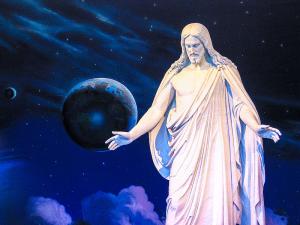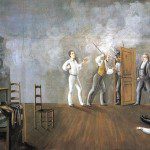Here’s a brief transcript from a filmstrip intended for Mormon audiences, “The Lord’s Laws of Prosperity.” It’s undated, but the LDS Church Library places it in the mid-1960s.
Narrator: Certainly it is within the province of the Lord to bring prosperity to anyone he considered worthy of it….
Man: Is he talking about spiritual prosperity or temporal prosperity?
Narrator: (Chuckle) I’d say both. He says The good things of the earth.” I’m sure the Lord requires that we acknowledge his hand in all our blessings. That he blesses us with houses and food and clothing and even automobiles and TV sets. All things in the earth are his … “All things which come of the earth in the season therefo, are for the benefit and the use of man, both to please the eye and gladden the heart.”
Man: That takes in almost everything. Cars, television, books, movies, they all come originally from the earth. They certainly please the eye and gladden the heart!
And here is a roughly contemporaneous excerpt from an essay by Hugh Nibley, one of Mormonism’s best gadflies of capitalism.
What we read about in the Book of Mormon is the “Nephite Disease”—and we have it! We should be glad that we do not have the much worse diseases that infect some other societies, and that there is greater hope for us. But diabetes if neglected can kill one just as dead as cancer—after all, the Nephites were terminated. We can be most grateful, therefore, regardless of how sick others may be, that God in the Book of Mormon has diagnosed our sickness for our special benefit, and prescribed a cure for us … “it must needs be that the riches of the earth are mine to give; but beware of pride, lest ye become as the Nephites of old.” (D&C 38:39.) There it is in a nutshell: it is the fate of the Nephites, not of the Lamanites, Greeks, or Chinese, that concerns us; and that doom was brought on them by pride which in turn was engendered by the riches of the earth. (Since Cumorah, 354)
It would be easy to simply contrast Nibley and the filmstrip here and to celebrate Nibley for being critical of the filmstrip’s undiluted and garish enthusiasm for the most mundane symbols of postwar American consumer capitalism. But Nibley (though perhaps not the filmstrip) is more complicated than that, because, despite many lefty-leaning Mormons’ attempts, the Book of Mormon does not present a simplistic critique of wealth. In several places, the book denounces people who (like ‘Man’) are overtly enthusiastic about getting gain and luxuriate in riches – but the book also promises that such wealth is in fact a gift from God. This is the famous Book of Mormon pride cycle: God blesses the righteous with material prosperity, and they then promptly descend into pride and sloth and get defeated in battle.
This is not to say, however, that the book celebrates “righteous” wealth-getting – rather, it offers an image of wealth as an accidental byproduct of being righteous. The book then cannot be read as an endorsement of capitalism either. Rather, the economics of the Book of Mormon are spiritualized, supernaturalized, abstracted from our present assumptions of cause and effect enough that they serve poorly as a textbook of social construction. The Book of Mormon’s writers live in a world in which God’s power has more to do with wealth – though not, perhaps, poverty – than one’s own talents. It calls us to live in that world too – and such a feat of religious imagination will always be difficult.











